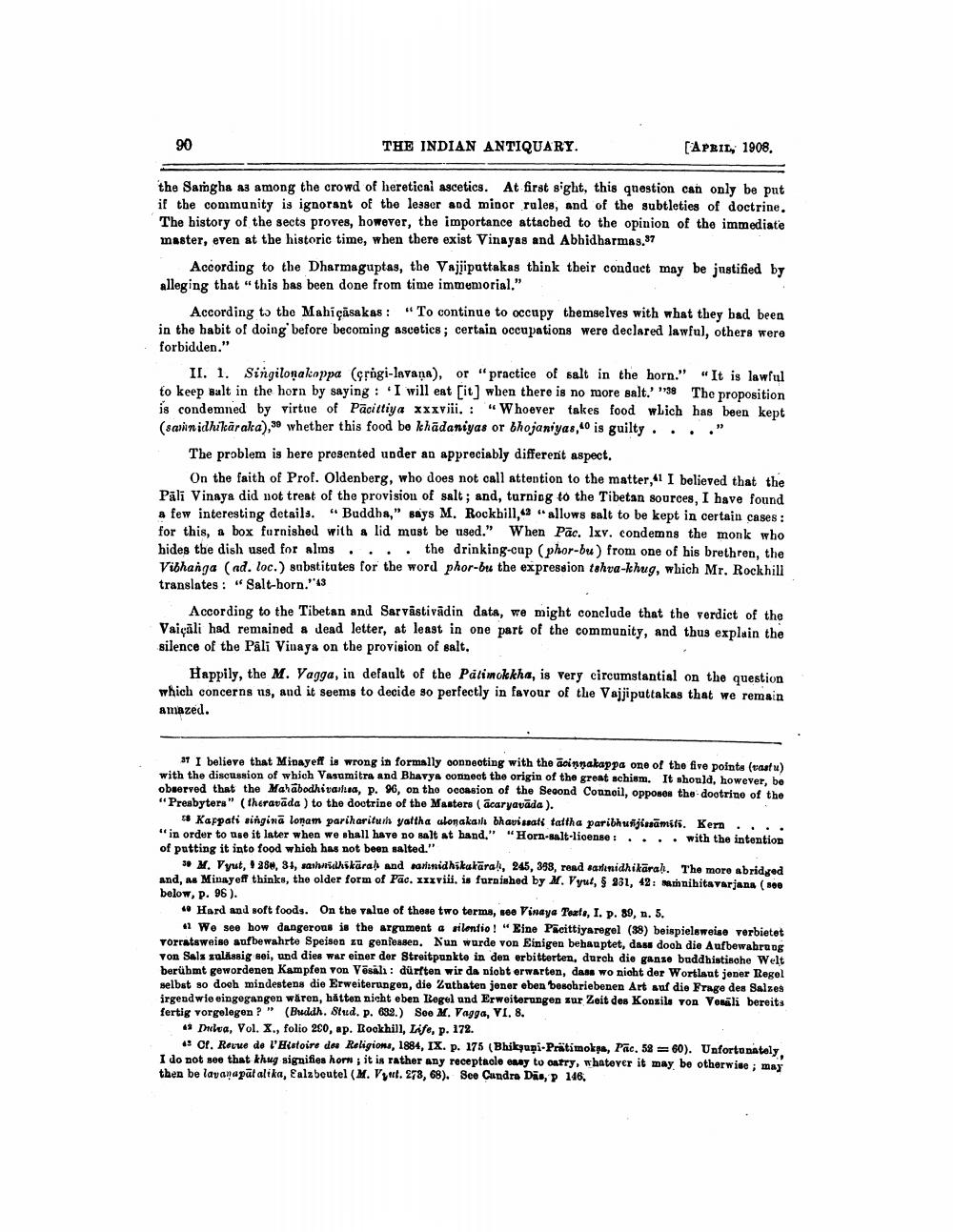________________
90
THE INDIAN ANTIQUARY.
[APRIL, 1908.
the Samgha as among the crowd of heretical ascetics. At first sight, this question can only be put if the community is ignorant of the lesser and minor rules, and of the subtleties of doctrine. The history of the sects proves, however, the importance attached to the opinion of the immediate master, even at the historic time, when there exist Vinayas and Abhidharmag.87
According to the Dharmaguptas, the Vajjipattakas think their conduct may be justified by alleging that this has been done from time immemorial."
According tɔ the Mahicasakas : "To continue to occupy themselves with what they bad been in the habit of doing before becoming ascetics; certain occupations were declared lawful, others were forbidden."
II. 1. Singilonakoppa (srigi-lavana), or "practice of salt in the horn." "It is lawful to keep salt in the horn by saying: 'I will eat [it] when there is no more salt."1939 The proposition is condemned by virtue of Pacittiya xxxviii, : "Whoever takes food which has been kept (savinidhikaraka),39 whether this food be khādaniyas or bhojaniyas, is guilty...."
The problem is here presented under an appreciably different aspect.
On the faith of Prof. Oldenberg, who does not call attention to the matter, 41 I believed that the Pāli Vinaya did not treat of the provision of salt; and, turning to the Tibetan sources, I have found a few interesting details. "Buddha," says M. Rockhill, "allows salt to be kept in certain cases : for this, a box furnished with a lid must be used.” When Pāc. lxv. condemns the monk who hides the dish used for alms.... the drinking-cup (phor-bu) from one of his brethren, the Vibhanga (ad. loc.) substitutes for the word phor-but the expression tahva-khug, which Mr, Rockhill translates: "Salt-horn."43
According to the Tibetan and Sar västivādin data, we might conclude that the verdict of the Vaicāli had remained a dead letter, at least in one part of the community, and thus explain the silence of the Pali Vinaya on the provision of salt.
Happily, the M. Yagga, in default of the Patimukkha, is very circumstantial on the question which concerns us, and it seems to decide so perfectly in favour of the Vajjiputtakas that we remain amazed.
T I believe that Minayeff is wrong in formally connecting with the kingakappa one of the five pointa (vast) with the discussion of which Vasumitra and Bhavya connect the origin of the great achiem. It should, however, be observed that the Mahabodhivalea, p. 96, on the occasion of the Second Council, oppones the dootrine of the "Presbyters" (theravada) to the doctrine of the Masters (acaryavāda).
Kappati aingina lonam pariharituih yaitha slonakan bhavisnatt tattha paribhusijissāmíli. Kern .... in order to use it later when we shall have no salt at hand." "Horn-salt-license .. .. with the intention of putting it into food which has not been salted."
* M. Vyut, 284, 31, awidhikäral and sanidhikakārak, 245, 398, read annidhikara). The more abridged and, ma Minayeff thinks, the older form of Fac. XXXViii. is furnished by M. Vyut, $ 331, 42: nihitavarjana (190 below, p. 96).
• Hard and soft foods. On the value of these two terms, see Vinaya Toata, I. p. 89, n. 5.
Wo see how dangerous is the argument a rilentio ! "Eine Pacittiyaregel (38) beispielsweise verbietet vorratsweise aufbewahrte Speisen zu genossen. Nun wurde von Einigen behauptet, dass doch die Aufbewahrung von Sals xalassig sei, und dies war einer der Streitpunkte in den erbitterten, durch die ganze buddhistische Welt berühmt gewordenen Kampfen von Vösälı: dürften wir da niobt erwarten, dass wo nicht der Wortlaut ioner Regel selbst so doch mindestens die Erweiterungen, die Zutaten jener eben bonohriebenen Art auf die Frage des Salses irgendwie eingegangen wären, hätten nicht eben Regel und Erweiterungen zur Zeit des Konzils von Vorüli bereits fertig vorgelegen ? " (Buddh. Stud. p. 632.) See M. Vagga, VI. 8.
11 Drilua, Vol. X., folio 200, ap. Rockhill, Life, p. 172.
. or. Revue de l'Histoire des Religione, 1884, IX. p. 175 (Bhikquņi-Pratimokya, Pac. 52 = 60). Unfortunately. I do not see that khug signifies hors; it is rather any receptacle easy to catry, whatever it may be otherwise ; may then be layanapatalika, Ealzbeutel (M. Vyut. 278, 68). See Cundra Das, P 146.




